John Janaro's Blog, page 129
March 3, 2020
Raissa Maritain: “Living in the Whirlwind”
 Don't just start "browsing" through Raissa's Journal unless you are prepared to have an ice bucket of God's incomprehensible 'crazy' love dumped on your head.
Don't just start "browsing" through Raissa's Journal unless you are prepared to have an ice bucket of God's incomprehensible 'crazy' love dumped on your head.The Journal is Raissa Maritain's posthumously published reflections on six decades of living (along with her husband Jacques) a life of intense faith as a layperson in the twentieth century world.
There are words in it that will give you shivers. You will remember the mysterious, awesome, and infinite God who loves us. By the very reality of His love drawing near to us, He shatters all our sentimental substitutes and comfortable notions of 'cheap grace' – all the domesticated categories we would like to use to contain Him.
Yet here is found also the hint as to why our own lives can seem so inexplicable. The identity and vocation of each of us is hidden in Him, and His love has set out to transform us.
I'm not sure I understand the words quoted below.
Surely here we are within the paradox of needing to "lose ourselves for His sake" if we are to have the life to which He calls us. We are called to go forth to God "without-keeping-back-anything" – even in our journey of "one step at a time," the steps are measured by Him.
How often life itself teaches us this when we walk by faith. There will be rest and consolation enough, but not on demand, not according to our own conception of ourselves and our limits. One day we will understand fully what a good thing it is that God leads us according to His wisdom and love, and our gratitude will fill our hearts. For the present moment, we have faith, hope, trust – we adhere to Jesus, we cry out to Him, we beseech His mercy, we never give up on Him.
“Surely we are to be pitied, we who are tossed in the waves of everything that constitutes suffering in this world, of everything which, like ourselves, is all misery and need, we who 'seeking peace and pursuing it' can nevertheless only find it under the goad of a thousand trials, in labour, in noise and in the midst of the world.
“We walk in darkness, risking bruising ourselves against a thousand obstacles. But we know that 'God is love' and trust in God is our light. I have the feeling that what is asked of us is to live in the whirlwind, without keeping back any of our substance, without keeping back anything for ourselves, neither rest nor friendships nor health nor leisure – to pray incessantly and that even without leisure - in fact to let ourselves pitch and toss in the waves of the divine will till the day when it will say: 'It is enough.'”
~Raissa Maritain
Published on March 03, 2020 15:56
March 1, 2020
What Saint John XXIII Learned From His Parents

From a letter of Saint John XXIII to his parents:
“Ever since I left home, ... I have read many books and learned many things that you could not have taught me. But what I learned from you remains the most precious and important, and it sustains and gives life to the many other things I learned later in so many years of study and teaching.”
Published on March 01, 2020 17:00
February 29, 2020
"Cartoon Selfie"
Published on February 29, 2020 13:34
February 28, 2020
The "Neo-Pagan Politics" of Today...and Tomorrow
 Here I would like to pick up and continue the considerations regarding "political idolatry" from the theme of the February 17 post (click link: "The Political Idolatry of the Emerging New Epoch"). The social orders of the near future might well claim for themselves a "divine" status, as did ancient pagan Rome and other empires of the past. This would not require any mythological symbolism, or indeed anything easily recognized as "religious" or "superstitious."
Here I would like to pick up and continue the considerations regarding "political idolatry" from the theme of the February 17 post (click link: "The Political Idolatry of the Emerging New Epoch"). The social orders of the near future might well claim for themselves a "divine" status, as did ancient pagan Rome and other empires of the past. This would not require any mythological symbolism, or indeed anything easily recognized as "religious" or "superstitious."Rather they may well be constituted entirely from secular motivational ideologies or systems of imagery. All will be confined, nevertheless, to the measure of this apparently physically accessible world — extended in unparalleled ways through space and time by a vast and pervasive technological power, but ultimately limited to overinflated monstrous new forms of immanence.
These tribal, ethnic, partisan, national, or utopian ideological "divinities" will not be worshipped in temples. Instead, they will be "soft idols" — empirically complex, constructed social bonds that engender their own compelling "aura" (some manner of fearful and attractive force).
They will also have their own peculiar "rituals" which will command different and more psychologically manipulative kinds of "sacrifices" from their adherents. The dignity of the human person will be much violated in the environment generated by this "neo-paganism." Parts of the world already endured crude (albeit openly, horribly brutal) forms of such regimes in the 20th century. What is yet to come, and even now is beginning to take shape, is something more subtle, perhaps more externally "comfortable," but also pernicious in ways difficult to uproot. Whatever its form, the contours of a neo-pagan political idolatry are frightening to consider.
The neo-pagan political order, in its full realization, declares itself the Ultimate Concern of human life. It defines success and failure; It measures what activities are worth pursuing; It determines what should be praised and what should be blamed; It establishes the categories of your social engagement and It INSISTS that you are explained by these categories; It stigmatizes any creative and constructive proposals that deviate from Its system; It establishes which people deserve attention and which people should be neglected and discarded; It measures "greatness" as whatever conforms to ITSELF; It insists that everything said here accurately describes Its political opponents but has nothing whatsoever to do with ITSELF. It has zero sense of humor and zero capacity to poke fun at ITSELF.
[O great New Epoch of untrammeled material power, here are your gods! Bow down to them!]
The invasive trajectory of neo-paganism (as I have distinguished it from the revival of ancient superstitions) already dominates current perspectives. It runs through the whole spectrum of today's politics. It is a disease that is very easy to catch. It is dangerous.
I think that sooner or later Christians and others who want to hold to love of God and real love of neighbor (with "neighbors" understood to be the actual human persons who need us individually or communally, whether on the street, in the womb, at the border, etc) are going to LOSE to one or another of the implacable emerging trends of neo-pagan politics.
I wish this were not the case. Indeed, I hope I'm wrong. Miracles, after all, are possible even in politics. Let's all pray for a miracle. "There are precedents" (as Thomas More says). And a miracle will humble us all.
However, if events follow the ordinary course of God's providence with all the space he has given to fallible human freedom and its consequences in the unfolding of history, Christians who have been relying on political scheming to "make things better" are going to have to face increasingly inescapable failure.
I am not making a declaration of pessimism. I am neither an optimist nor a pessimist. I am a person of hope. I believe in the victory that has already been won for all time and beyond all time, and I have hope that the reflection of its light may yet illuminate the problems of our time in a fruitful manner for temporal society. For now, I am trying to situate those problems within a larger context. Rather than elaborate on all the various symptoms, I think it might be useful to make a more general diagnosis.
Let me be clear: I am not saying, "we should all just give up on political activity." More on that below, but right now I want to make a distinction. I think that Christians who are so much embroiled in politics because they are expecting to effect some wonderful overall political fix from within the present system are headed for failure. I'm not "hating on them." This is just the way I see it unfolding. My hope and prayer is that they will accept failure rather than silencing their consciences, "adjusting" the criteria for their judgments in order to fit into the system, and eventually even becoming acolytes of the neo-pagan order (again, forgive the blunt image — but there are historical precedents for precisely this kind of tragic turn).
On the other hand, there are people whose political activism within the current system is vigorous but specific: they are trying to further this or that initiative, or obtain this or that improvement, or patch this or that hole, or blunt the impact of particular or more general disasters. There can still be success in the pursuit of these objectives, and this work will still be possible — I hope — for a long time. I admire these people. I don't often grasp their methods, nor do I have the energy that is given them to fight for these things. This is a difficult path. But I discourage no one from following their particular mission in good conscience and good faith. Go for it! But "keep God first," pray every day, and be careful. There are dangers for everyone who ventures into the halls of power.
What I'm saying is that the whole political system is becoming "neo-pagan" (even if some who hold power still invoke Christianity or find it convenient to use faith in their strategy). In the midst of the upheaval of this emerging new (and tumultuous) epoch, politics across the board is once again becoming an uninhibited thrust toward a total grip on human society, and an ultimate defining measure of human personhood and its dignity.
Whether they realize it or not, whether or not they have "good intentions," the political forces of today aim to fill the pervasive gap in a society that has forgotten God and lost sight of the transcendence of the human person. There are so many ways to exercise power over people who are so impoverished in their hearts and souls. People are tossed about in a raging storm of "new things" they can't control, that increasingly shape their imaginations, that torment them with confusion about their own identity. "What does it mean to be human?" The question is drowned out by a desperate cacaphony of reductive identity claims, neo-tribal "ritual chants," conflicting demands for recognition, and endless rounds of misinterpretation and distraction.
The space left empty in the human spirit by the lack of this question is easily occupied by political forces. They have (potentially) access to dimensions of power beyond anything we can yet imagine: not only the "hard power" that relies on physical coercion, but also (and especially) the "soft power" of a multitude of subtle and diverse forms propaganda and new ways to distribute "social reward" for those who cooperate (and to marginalize those who don't).
In this new epoch, many will wield these demiurgic weapons without even realizing it. They will see themselves as giving order and meaning to the chaos of the ever-expanding "extensions" of technology and "information-overload" that have swept up the lives of multitudes of people into tangles of irresolvable complexity. Our power-politicians will come to us as our "saviors," with solutions (impressive ones, even), but also with the expectation of gratitude and unambiguous fidelity. And just as there were many pagan gods who made war against one another in the ancient myths, so there will continue to be many political power-systems that will fight and demand loyalty in different ways.
 How can a Christian find a place for activism in an increasingly imposing neo-pagan political order?
How can a Christian find a place for activism in an increasingly imposing neo-pagan political order?This is an important question. The time may come when faithful Christians (and anyone who sincerely loves the human person as the image of God) will no longer be able to even pretend that proximate political "victories" are possible without compromising our consciences.
This would be very hard. But it wouldn't be the worst thing that could happen. I think circumstances are leading in this direction. Nevertheless ultimately we may all be better on account of it, because it will require us to acquire a fresh perspective.
We will feel the need to remember who we are and who we belong to and who is the foundation of our freedom and our community. This alone is of inestimable value. But it will also engender practical wisdom on many more mundane levels. We will be compelled to find more space for creative endurance in our political activity, including non-violent protest and prophetic witness (with all the risks these actions entail). Perhaps we will find that we can accomplish more for the good of people in our local environment or in other limited connections insofar as these can be wisely and carefully sustained. We may even begin to discover the value of a new kind of politics that has as its motivating ideal a commonwealth of greater human depth, with renewed forms of that openness to transcendence which is intrinsic and essential to every human person.
This new kind of politics does justice to our humble aspirations to build up the common good and for some of us to be entrusted with political office. But it is a politics that learns to "play the long game," that does not define itself by the desperate need to WIN the next election.
We can make a beginning in this new political mentality now. It's likely to be a very small beginning, without much coherence, but just taking that first step will have real political significance. We will be letting go of political fantasies, and entering the realism that embraces all the factors of participation in common life here and now, with an adequate perspective on its possibilities and limits.
This means coming to terms with the fact that a single election or legislative proposal has at most a relative importance in relation to our long term goals for the renewal of the foundations of politics. But in this way our reason will be freed to grapple with the particular problems that come within the purview of our freedom, allowing us to propose specific actions shaped by a political vision that is not subservient to the "success" of one or another of the presently dominant neo-pagan ideologies or tribal cults. We will look for concrete action that enables us to take responsibility for our society step by step.
Much of this will seem inglorious in our own eyes (though some humble, apparently insignificant works may be celebrated for their heroism by future generations). In any case, we will be free from craving for glory and recognition, because we know the real basis of our dignity as persons and the value of our work.
It is crucially important to begin, however poor and divested of power such gestures might appear to be.
We may not even agree about how to take this first step, but we all need to GET OFF the various factional roads that currently dominate political and social life — roads that lead inexorably to "worshipping Caesar" (trusting Caesar, forgetting God, forgetting to be human).
This task is urgent. It will be less traumatic and wrenching, I believe, if we do it NOW, before it becomes an evident and inescapable duty for all of us.
Published on February 28, 2020 20:35
February 26, 2020
God's Love is the Measure
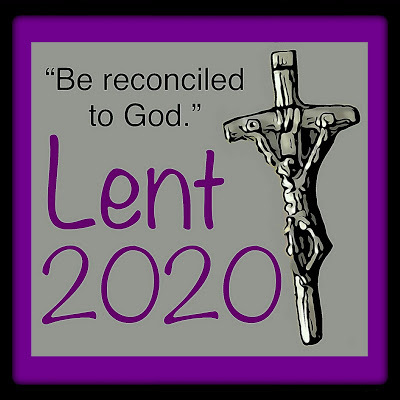 We have begun our annual season of penance and preparation for the celebration of the great mystery of our salvation, the death and resurrection of Jesus.
We have begun our annual season of penance and preparation for the celebration of the great mystery of our salvation, the death and resurrection of Jesus.Last year's Lent seems vivid to me in this moment, encompassing as it did the long vigil of our family with my father during his last days, his death on April 3, and his burial in the hope of the resurrection. We continue to pray for him and entrust his soul to the mercy of God.
Sometimes I think I have "gotten used to" his passing from this life, but then other times it feels like it just happened and the sorrow hasn't diminished at all. It can be overwhelming.
In any case, this year's Lenten pilgrimage begins for me in a different way than ever before. It all seems more "concrete," somehow. My emotions are perplexed and I don't feel very strong. Jesus, have mercy on me!
Ultimately the mystery of God's love is the measure of everything.➕
Published on February 26, 2020 20:50
February 25, 2020
A Call to Life and to Relationship
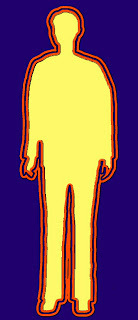 "Human beings ... possess a uniqueness which cannot be fully explained by the evolution of other open systems. Each of us has his or her own personal identity and is capable of entering into dialogue with others and with God himself.
"Human beings ... possess a uniqueness which cannot be fully explained by the evolution of other open systems. Each of us has his or her own personal identity and is capable of entering into dialogue with others and with God himself."Our capacity to reason, to develop arguments, to be inventive, to interpret reality and to create art, along with other not yet discovered capacities, are signs of a uniqueness which transcends the spheres of physics and biology.
"The sheer novelty involved in the emergence of a personal being within a material universe presupposes a direct action of God and a particular call to life and to relationship on the part of a 'Thou' who addresses himself to another 'thou'. The biblical accounts of creation invite us to see each human being as a subject who can never be reduced to the status of an object."
~Pope Francis, Laudato Si 81
Published on February 25, 2020 20:47
February 24, 2020
"Rose Study, No. 10"
Published on February 24, 2020 20:30
February 23, 2020
Signal Knob in the Morning Light
 This is Signal Knob, the northern peak of Massanutten Mountain, as we see it from the East side in the late Winter morning light.
This is Signal Knob, the northern peak of Massanutten Mountain, as we see it from the East side in the late Winter morning light. We see it in so many places around here that we could almost get used to it. In the past, I drove by this particular view every day. I can still almost see the mountain from my window at home. It ends up in many of my pictures, somewhere on the horizon.
It's a part of this place, and it's been here for a long long lonnnnng time.
Published on February 23, 2020 19:57
February 22, 2020
Remembering Luigi Giussani
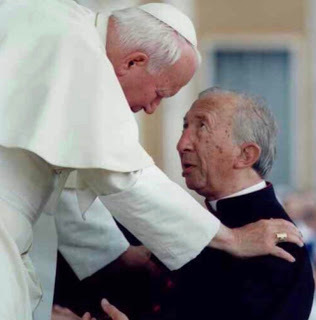 Today is the 15th anniversary of the death of the Servant of God Msgr. Luigi Giussani. It is very beautiful that this great priest died on the Feast of the Chair of St. Peter, in light of his remarkable devotion to Peter's successors.
Today is the 15th anniversary of the death of the Servant of God Msgr. Luigi Giussani. It is very beautiful that this great priest died on the Feast of the Chair of St. Peter, in light of his remarkable devotion to Peter's successors.His longtime friend, Saint John Paul II, would go to join him in eternal life a month and a half later.
But before that, the ailing Pope sent his personal representative to celebrate the funeral of this great “teacher of humanity,” a Cardinal who once said, "Fr Giussani changed my life." Within two months, that Cardinal became Pope Benedict XVI.
Meanwhile, on the other side of the world from Rome, another Cardinal helped present his own country’s first editions of some of Giussani’s books, saying “He has helped me to appreciate and live more deeply my own priesthood.”
Seven years ago, as this Cardinal prepared to retire after a lifetime of intense service to the Church, planning to reside in and become chaplain of an elder care home, he received an unexpected call from Rome for one final service. A conclave.
But it turned out to be rather a longer task. On March 13, 2013, Cardinal Jorge Bergoglio was elected Pope Francis.
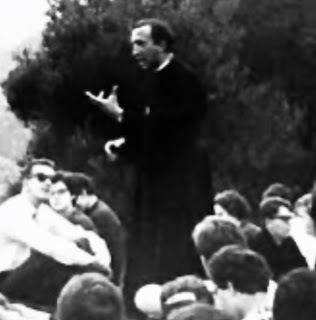 But Giussani did more than inspire the Popes of our time. He taught thousands of ordinary people in Italy and all over the world. One of those people is me, even if I have been one of the more distracted of his students. Still, insofar as I have anything worthwhile to communicate, the credit must go first of all to the two men in the first picture who taught me and showed me how to stay with Jesus.
But Giussani did more than inspire the Popes of our time. He taught thousands of ordinary people in Italy and all over the world. One of those people is me, even if I have been one of the more distracted of his students. Still, insofar as I have anything worthwhile to communicate, the credit must go first of all to the two men in the first picture who taught me and showed me how to stay with Jesus.My dear friends of the CL Movement: it is distance and distraction that keep me from seeing you more often, but it is also illness and my debilitating condition. I miss you all, but hold you close in my heart and prayers.
Published on February 22, 2020 18:28
February 20, 2020
"Is There Anyone?" Demi Lovato's Long Hard Road
 "A hundred million stories / And a hundred million songs / I feel stupid when I sing / Nobody's listening to me / Nobody's listening."
"A hundred million stories / And a hundred million songs / I feel stupid when I sing / Nobody's listening to me / Nobody's listening."I have a big place in my heart for Demetria Lovato.
She has had so much pain, and has been fighting so hard. Over the past decade, she has fought for success, and to use her talents and expand her creativity, while fighting against bipolar disorder, drug and alcohol addiction, anorexia and bulimia, and other forms of self-harm.
"Anyone, please send me anyone..."
The depression-and-mania-swings came first, before her days as a teenage star on the Disney Channel, where she introduced everyone to her remarkable charm and sense of humor, and before her career as a pop/R&B singer established her as a familiar face and formidable voice in the 2010s.
But all the fame and the money and the scrutiny of emerging social media platforms only made things more difficult for Demi as she struggled with her body-image and with the propensity for self-medicating that she inherited from her estranged (and since 2015 deceased) father. Still, she kept trying, not only to return from setbacks but also to share her vulnerability with a level of honesty that only proved itself more admirable by the generosity of heart and guileless effort she put into it.
After her first public breakdown in 2010, she went through treatment, wrote articles to encourage other teenage girls, and made a documentary where she spoke frankly about her illness and addictions and how important it is to get help. She seemed determined to set an example of "being in recovery." She wanted so, so much for things to work out. And she was very impressive... even a little bit too impressive.
"I need someone."
But being "honest" about such things is like peeling an onion: there's always another layer underneath. It's a process. I don't think Demi realized the layers of that process back in 2011. Still, her struggle was sincere, candid, and earnest. She helped raise mental health awareness especially with the younger generation.
"I tried and tried and tried some more / Told secrets 'til my voice was sore..."
Demi has tried and tried, and told plenty of secrets. She is generous and gutsy, and really has a passion for showing people that mental illness and addiction are real, by letting people see so much of her own suffering. It's inspiring. But I have many years of experience with mental illness and I know how it can drive or exacerbate all kinds of self-destructive behaviors. And I know that life is long and hard. A lot of things change. We don't have the strength in ourselves alone to engage and endure life's challenges, difficulties, and confusion.
We need roots. And good soil is hard to find in the storms of our times. So, dear Demi, I am worried about you. I'm concerned for you.
"I feel stupid when I pray / So, why am I praying anyway? / If nobody's listening."
I have been aware of Demi Lovato over the past decade, and I have followed her mental health journey with a sense of solidarity because I know some of these deep psychological and emotional holes she has been in, even if I haven't faced some of her other specific issues.
But I was not interested in her music.
It seemed like teen pop, and then later it took on the typical overloaded sexualization in style, imagery, and theme (though less than some of her peers) that so often spoils or banalizes music even as it objectifies and disrespects the female body.
This objectification is pushed on women artists today as "empowerment" - but this kind of reductive and excessively sensualistic pseudo self-assertion frustrates the deeper need for a relational intimacy within the inherent boundaries that guide and protect genuine human relationships. And for someone with body image difficulties, trying to wear all these outfits to "be sexy" (i.e. according to someone else's definition) and then trying to stay "sexy" day after day, constantly comparing your body and finding that it falls short of a (fake) "ideal" - all this must be a living hell.
Gosh Demi: you're starting out with serious bipolar depression (this chemical imbalance with a hereditary foundation in Dad and Mom too), which you aggravate with cocaine, anphetamenes, and alcohol addiction (throw opiates in the mix as well). And then you have to be even more obsessed with your body image, because (as you once put it) "no one loves a fat rock star"? So you binge eat even more (and purge it) and take more pills.
Demetria, you don't have to do this. You don't have to live this way. I think you are beginning and growing toward the realization that you can be free from all this junk. It's not worth what is ultimately an ephemeral affirmation from people who don't care about you.
"I used to crave the world's attention / I think I cried too many times / I just need some more affection / Anything to get me by..."
You deserve so much more than "anything to get you by." And you will find much more. But take all that aspiration and energy and all the talent (which has gotten you this far) and aim higher. In music, aim for the level of artistry that you are capable of achieving.
I find myself addressing Demi in my mind. Others must be saying some of these things to her, because she seems to be turning a corner, musically (and hopefully in other more important ways too).
I am definitely interested now in where she is taking her music (In retrospect, I can see how her voice has developed, and the prime years for her as a singer are just beginning.) She may be finding a new creative groove, and gaining the personal balance she needs to make some really outstanding music with her powerful emotionally evocative voice. (But, first of all, Demi, take care of yourself, please! You are a person first, a precious human person.)
Several weeks ago I wrote a couple of long articles about the Grammy Awards, or about topics more or less related to them: recorded music, celebrity, a few of the artists who won awards. I did promise to write one more article. Something awesome happened at the 62nd Annual Grammy Awards last month. Though I didn't watch the show, I was able to see and hear it on the Internet the next day.
It was all over the Internet. Demi Lovato sang, for the first time since 2018. And she Brought. Down. The. House.
Behind this musical event, however, there was the resilience of her humanity and her determination to continue to live and tell her story, with new levels of honesty.
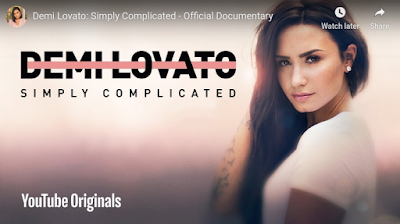 In 2012 she made a documentary called Stay Strong, in which she speaks openly about her bipolar diagnosis, her drug use, her self harm, her eating disorder, and her experience of being in recovery.
In 2012 she made a documentary called Stay Strong, in which she speaks openly about her bipolar diagnosis, her drug use, her self harm, her eating disorder, and her experience of being in recovery.She admits in the video that she is not always perfect. No doubt she learned much from her first rehab experience, but in fact she was already falling off the wagon. More interventions would be needed.
In her second documentary in 2017, Simply Complicated, she admits - with unflinching candor - that she was using cocaine even during the interviews on the 2012 documentary. We might wonder at this point: How can we believe anything Demi Lovato says about herself? But skepticism would miss the point of what's really happening here.
Demi is opening up about so many difficult and very complicated things that she hardly understands, while she is engaged in the very process of trying to cope with them. It's not surprising that she doesn't tell us everything, hides things, cheats and backslides and doesn't even want to admit it to herself much less us.
The fact is, she doesn't have to tell us anything at all. How many public people have faced similar circumstances and kept everything private? I don't blame them. But Demi - unpolished, beaten down, damaged, and confused on lots of things - has a big heart. She's trying to be open about an ongoing experience, to give us a window into the reality of her suffering. It's a long hard road she has to travel. Demi, her care givers, her family, everyone involved is undergoing a learning process, and she's allowing us to see that. It's pretty remarkable. Obviously, these documentaries are not for everyone. They really are for "mature audiences" who are able to use discretion.
In 2017, she celebrated five years of sobriety, and the latter documentary takes us through many of the ways that were helping her keep it up. It gives us a frank picture of how grim things had gotten beneath the surface before her second breakdown. Apparently, however, she had found some stability, although she admits in the video that the eating disorder is still flaring up sometimes.
But she had so much to handle in those days. Life got harder in 2018 (we don't know why, and she doesn't have to tell us) and this now 26 year old girl with a huge nine million dollar house in Southern California fell in with bad company. Somewhere in the midst of this new wandering into booze and drugs, she got onto some downers, something like oxycontin - but "from the street," jacked up with the cheap but dangerously strong drug fentanyl that is often used to "stretch" the quantity of illegal opioids (without informing the buyer).
On July 27, 2018, Demi Lovato nearly died from an overdose. After several days in the hospital, we all heard that she was going to pull through. But she pretty much removed herself from the unsleeping gaze of the public eye for a long stretch after that.
Then word came that she was working on new music and preparing a comeback. (This is another frustrating feature of pop music and entertainment culture: the relentless demand to stay up-to-date. Of course, many performers love the spotlight and are anxious to get back to it, and Demi had recorded six albums in ten years.) Everyone would have understood if she had decided to take a few years off. But some artists are driven to create and some performers are driven to get back on stage. They have the urge to give more of themselves, but also perhaps a distorted dependence on cheering crowds and the grandiose but fleeting euphoria they bring. The spotlight is a dangerous place.
She took the stage on January 26, 2020 in a billowy white floor length gown with just a piano player accompanying her. The crowd of celebrities and VIPs at the Staples Center seemed to remove their invisible masks for a moment. Everybody remembered that they were just human beings, whose hearts couldn't help rejoicing just because she was alive. People were glad to see her. Millions watching the awards show were glad to see her.
She began to sing and then faltered, choking back sobs. The crowd cheered her on. She could have sung anything if all she wanted was the approval of the audience. But in this moment, Demi showed her depth as an artist. She had a new song, shaped from out of the dark and seemingly hopeless caverns of the soul that she had fallen into (and that she is no doubt still trying to find her way out of). And she sang it with all of her anguish and all of her hope, in a bold, resonant voice that was impossible to ignore. People weren't expecting anything like this. They were stunned by what they heard:
I tried to talk to my piano
I tried to talk to my guitar
Talk to my imagination
Confided into alcohol
I tried and tried and tried some more
Told secrets 'til my voice was sore
Tired of empty conversation
'Cause no one hears me anymore
A hundred million stories
And a hundred million songs
I feel stupid when I sing
Nobody's listening to me
Nobody's listening
I talk to shooting stars
But they always get it wrong
I feel stupid when I pray
So, why am I praying anyway?
If nobody's listening
Anyone, please send me anyone
Lord, is there anyone?
I need someone, oh
Anyone, please send me anyone
Lord, is there anyone?
I need someone
There is another verse (which I quoted above) but this conveys the power, the moving quality, the soul-provoking character of this song which is called "Anyone." In this song, Demi reaches back and gets hold of something deeper than her own personal struggles or the struggles of people who suffer from mental illness and/or addiction: she finds a suffering, a terrible fear, a loneliness that every human being experiences in some form or other - the agonizing question that often lies buried deep in the heart but bursts open in all the painful and incomprehensible moments of life that we all face.
 A question, a lament, an angry frustration that gives way to a plea...
A question, a lament, an angry frustration that gives way to a plea...And suddenly, in the very expression of loneliness it becomes a dialogue - it's a desperate, begging plea but there is nothing degrading about it. It's our plea, the cry of the human heart that knows its own need. The cry of the human heart, stripped bare, uncomfortably exposed for most of us.
We want quickly to cover it up, interpret it in terms of the sick person, the desperate person, the person on drugs with a broken brain who is crying for help. But the song doesn't ask for "help." It asks for "someone." It doesn't ask for "someone to talk to" or "someone to help me" or "someone to take this problem away." It just asks for someone. Indeed, it yearns just for the be-ing of another: "is there anyone?"
Demi herself can't bear to reflect on the absolute vulnerability of this song. She explains that she wrote it and initially recorded it four days before her overdose in 2018. It emerged from the particularities of her desperate state at that time.
Still, she sang it at the Grammy Awards in 2020, and the immediate and compelling character of the performance proclaimed it in the present tense, a year into her third recovery. The question doesn't go away. It doesn't get healed. It grows deeper.
"...why am I praying anyway? / If nobody's listening..."
This is a terrifying question, and something of an angry question. It doesn't assert that there is no one to hear her prayers. Rather it expresses frustration at the inaccessibility of this mysterious one who seems beyond the reach of words. This should be the point when the singer gives up. "Nobody's listening..." Instead, she plunges directly into the unbearable silence with the agony of her own need.
"Anyone, please send me anyone / Lord, is there anyone? / I need someone, oh / Anyone, please send me anyone / Lord, is there anyone? / I need someone"
On the second time around with this refrain, Demi cuts loose and puts all her voice into it, wailing but without losing her pitch. She slays some high notes that take your breath away. She's putting everything she has into this plea, this empty space, this eloquent wound: "please send me anyone ... / I need someone"
Demi is not a "conventionally religious" person, but she believes in God, and she prays. (Lots of music people believe in God, regardless of how messed up they are - because music is the sound of the human heart searching for transcendence.) Right now, I'm not interested in what she thinks about this or that. I'm just hearing her voice coming right out of her heart, and ... this is a prayer. This is a prayer. It's also an impressive work of art, making something beautiful out of these experiences of suffering, and putting it out there and lifting it up as far as it can go.
But first of all, it is a prayer.
"Lord, is there anyone?"
What can I say when someone is praying such an open and ardent prayer. I can join her in that prayer: "Lord, I need to see your face" because all the theology and eloquence in the world will not save me. "I need a human face that reminds me of your love, every moment, every day. You came into the world, Lord, in human flesh and blood, with a human face, and you gave yourself. You didn't give yourself to us so that you could become a myth or an ideology. You didn't come just to give us more rules. You came to be with us, and you called us together to accompany us on the journey that leads to you. And you told us to love one another, because we can't do this thing called life all by ourselves. We can't make this journey alone. We need someone. I need someone and it's too easy to forget that need during so much of my time. Please send me anyone ..."
... and I could qualify that further with all kinds of words (I have already used too many) but I'm going to leave it open. Demi is taking that risk, plunging her heart into the Mystery of God. She has great courage. I don't, but I want to follow her as much as my small heart can right now, and join her in taking that risk... What am I afraid of? "God is good. All the time."
Demetria, let me tell you something. Often "I feel stupid when I pray." Yes, I do. You expressed it very well. There are lots of reasons why we might feel stupid when we pray or sing or do anything else.
You and I have these strangely wired brains that are firing all over the place, signals and chemicals, too much here, not enough there. We can trace the pattern of ancestors with these precious, odd brains who passed them on to us. But there's not just the hindrances of our complicated wiring; there are strengths and gifts and aptitudes that come with it too. And our brains serve our beautiful minds, our intelligence, our creativity.
I heard you say recently that you are going to "accept" your body. You're not going to pretend it's perfect, and you're going to keep fighting the urge to try to make it look "perfect" by messing around with the way it works with food. You also need to "accept" that very special part of your body that is your brain. It's not perfect, and you can't make it "feel perfect" with a sledgehammer of induced chemicals you get on the street (you know that better than I do).
 Take care of your brain, Demi. It still has amazing possibilities to heal and to grow in new ways. Work with your brain.
Take care of your brain, Demi. It still has amazing possibilities to heal and to grow in new ways. Work with your brain.There are fine tools that can give our brains a little help, and doctors who know how to guide us to use them very carefully. You may not be able to use those options, but I'm sure the people who are helping you with your recovery know what's good for you (and what's not good). Listen to them.
You're praying for "someone" and these people are part of the answer to that prayer.
Keep praying, especially when you feel stupid doing it. There are those throughout history who have great wisdom in the ways of prayer, and they say that - sometimes - "feeling stupid when you pray" can be a sign that you're getting closer and deeper to the One you seek.
That lovely name, "Demetria" - I don't know what your parents had in mind in giving it to you, but it's a Greek name and it links you to a very special young person from the early fourth century, Demetrios of Thessalonica. He was a warrior, a man of real courage, a defender of the poor, a martyr for his faith, and - according to the traditions of many peoples down through the centuries - a wonderworker, a worker of miracles, a source of healing. I'm just tossing that out there, because he's a real person and I have found that these people are not so far from us as we may think. There are others who can help you too - perhaps some people you have known during your own life. It's not superstition to ask for their help. It's a relationship with another person, a friendship with people who have gone before us.
We're not ever alone, really. Sometimes we feel that way because of our illness. Sometimes we feel that way because we are made for a greater love, and the whole of life is a journey to that Love. Sometimes when our hearts feel broken, it's because they are being made bigger. Or it's a combination of all these factors and others too, because God writes straight with crooked lines. Life is messy. Do your best, day by day.
And (I'll say it again) keep praying, no matter what. Never give up. This is fundamental and essential. You've got a song. Sing it.
Demi, I am not going to have to write a memorial article about you. Because you're going to make it. You may not always be able to "stay strong," but please, just "show up" every day. Show up for the people that matter, the people who have been given to you. Make your music, perform too, put on a show if you want, but don't get lost in all that. Don't disappear from the lives of the people who really love you.
This song shook me. Dang! There's a lot of pain here, beautifully expressed pain. It ends with "nobody's listening" but those don't feel like the last words, Demi. This is not the voice of somebody who is giving up. Bring whatever you're feeling to God, all the "nobody's-listening"-feelings however deep and awful. It has been a hard road. But the assertion your mind suggests to you from those feelings (that, really, "nobody's listening") - that assertion is not true. In any case, just give it all to God and let God carry it with you. Then keep going, step by step. "Please send me anyone..." That is your heart calling out to the One who made your heart. The Lord will not fail you.
Be assured also of my own poor prayers for you, and my prayers along with you, dear Demetria, as a fellow sufferer and sinner and brother. And keep the plea, the yearning of this song in your soul, and of the songs yet unknown and unheard that will be born from it.
***Everybody else, listen to her. It's been a long hard road for Demi Lovato. Stick with her through to the end of this song. <<<<--- click this link.
Or here:
Published on February 20, 2020 20:32





